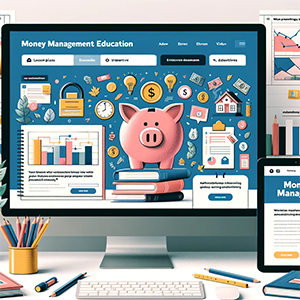MONEY MANAGEMENT
Lessons and Worksheets

Welcome to our page dedicated to teaching the essential skills of money management. As educators, we understand the importance of equipping our students with the knowledge and tools to build a solid financial foundation. That's why we have created an extensive collection of resources specifically designed to help teachers like you deliver engaging personal finance and money management lessons.
Within our site, you will find a wealth of educational materials, including lesson plans, interactive worksheets, captivating educational videos, and informative articles. Our aim is to provide you with a diverse range of resources that cater to different learning styles and facilitate effective instruction on the topic of money management.
The lesson plans and worksheets are not only extensive but also flexible, allowing educators to tailor them to specific classroom dynamics or individual learning needs. They cover a broad range of topics within money management, including budgeting, investing, understanding credit, and smart spending habits. The educational videos available on our site are particularly engaging, breaking down complex financial concepts into easily digestible content through animated visuals and straightforward explanations.
Moreover, our collection of articles provides deeper insights into money management, offering both foundational knowledge and advanced strategies. These articles are an excellent resource for teachers looking to expand their understanding and bring a more nuanced perspective to their financial education curriculum.
Browse through our collection of lessons on money management and discover a range of engaging topics that cover the fundamentals of personal finance. Whether you're teaching in a classroom setting or guiding independent study, our resources will support you in equipping your students with the skills and mindset needed to make informed financial choices.
Understanding Money Management
Money management is the process of organizing and planning how to budget, save, invest, and spend your financial resources wisely. It encompasses a range of financial activities, including setting financial goals, creating and adhering to a budget, effectively managing debt, and preparing for future financial needs.
Effective money management is crucial as it enables individuals and families to maximize their financial resources, ensuring long-term financial security and stability. By learning to manage money wisely, you develop a strong foundation for making informed financial decisions. This involves not just saving money, but also understanding how to allocate it towards various goals, whether it's for retirement, education, investments, or day-to-day expenses.
Money management skills are essential for achieving financial independence. They involve learning to balance your income with your expenses, understanding the importance of an emergency fund, and knowing how to invest in ways that align with your financial goals and risk tolerance.
The following lessons are designed to provide a comprehensive understanding of money management basics:
Money Management Lessons and Worksheets
WHAT IS MONEY MANAGEMENT LESSON
Students learn essential money management skills for financial stability. The lesson covers budgeting, teaching how to plan and track income and expenses. It emphasizes the importance of saving for emergencies and future goals, and investing, highlighting compound interest and starting with small amounts. The lesson also focuses on spending habits, encouraging informed purchases and distinguishing between wants and needs. It includes debt management strategies and underscores the importance of building and maintaining good credit. Lastly, the lesson guides students in financial planning, setting realistic goals for financial freedom and overall health.
50/30/20 Rule | Budgeting & Saving Lesson
This lesson teaches students money management using the 50/30/20 rule, a budgeting strategy that balances needs, wants, and savings. Students learn to allocate 50% of after-tax income to needs like rent and utilities, 30% to wants such as entertainment, and 20% to savings and debt repayment. The lesson includes tips for monitoring spending, reducing expenses, and emphasizes starting small with savings. It's adaptable to various financial situations, promoting a balanced and secure financial future.
Empower your students with essential budgeting skills using our comprehensive worksheets and lesson plans. Designed to teach the fundamentals of budgeting, these resources offer practical insights into managing income and expenses, essential for personal financial success. Our printable materials cover key concepts in household budgeting and consumer math, presented through engaging activities and real-life scenarios. This approach ensures a dynamic learning experience, equipping learners with the tools to navigate the complexities of financial planning effectively.

Explore the essentials of saving money through an engaging learning journey that delves into the importance of savings, effective strategies for setting financial goals, and the dynamics of personal money habits. Our comprehensive guide offers a foundational understanding of basic saving concepts, empowering you with the knowledge to cultivate healthy financial practices for a secure future.

Delve into the realm of investing and money management with our tailored educational resources for teachers. These materials are designed to simplify complex financial concepts, such as stocks, stock market dynamics, interest, and income statements, making them accessible and understandable. They include practical lessons on buying stocks, calculating shares, understanding share price changes, and reading stock tables. Additionally, our resources provide insights into the intricacies of security pricing, equipping educators with the knowledge to confidently guide their students in navigating the financial world.
Educators can deepen their understanding of credit fundamentals with our focused resources, designed to elucidate the nuances of credit cards, the nature of credit itself, and the implications of paying interest. These materials, specifically tailored for teachers, provide clear and concise information about using and teaching about credit cards, helping to demystify the often-complex world of consumer credit for both educators and their students.
More Teaching Money and Personal Finance Lessons